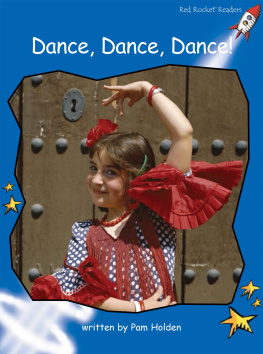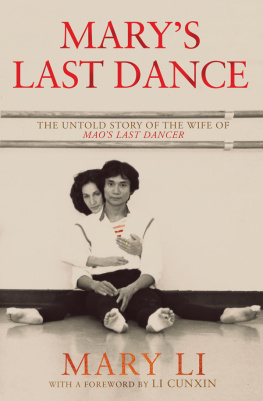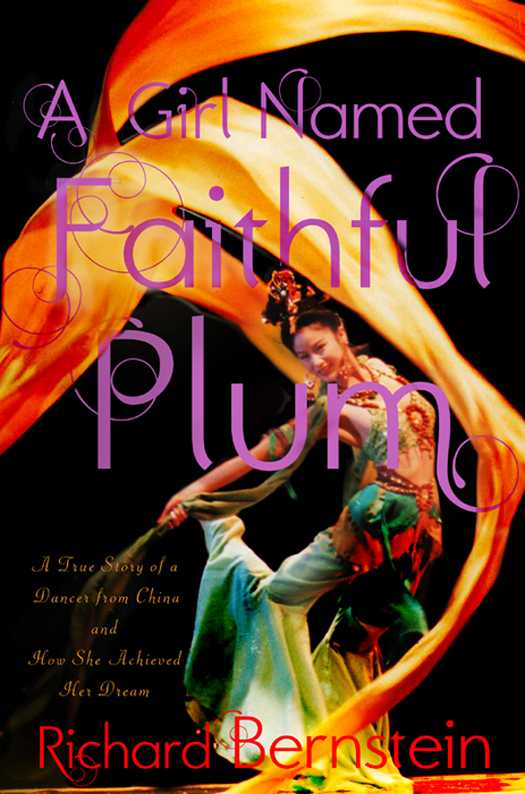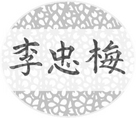THIS IS A BORZOI BOOK PUBLISHED BY ALFRED A. KNOPF
This is a work of nonfiction, though some names have been changedspecifically those of Teacher Zhu, Comrade Tsang, and a few minor charactersand conversations have been imagined. Also, events that actually took place over a two-year period have been compressed into the single year covered by this book. But everything else, starting with Zhongmeis departure from her hometown on that fateful day in 1978, is described as it actually happened.
Text copyright 2011 by Richard Bernstein
Jacket photograph copyright 1995; from the authors private collection
All rights reserved. Published in the United States by Alfred A. Knopf, an imprint of Random House Childrens Books, a division of Random House, Inc., New York.
Knopf, Borzoi Books, and the colophon are registered trademarks of Random House, Inc.
Visit us on the Web! www.randomhouse.com/kids
Educators and librarians, for a variety of teaching tools, visit us at
www.randomhouse.com/teachers
Library of Congress Cataloging-in-Publication Data
Bernstein, Richard.
A girl named Faithful Plum : the true story of a dancer from China and how she achieved her dream / by Richard Bernstein.
p. cm.
eISBN: 978-0-375-98434-1
1. Li, Zhongmei, 1966 2. DancersChinaBiography. 3. DancersUnited States
Biography. I. Title.
GV1785.L485B47 2011
792.8028092dc22
[B]
2010048722
Random House Childrens Books supports the First Amendment and celebrates the right to read.
v3.1
To Elias,
a.k.a. Tiandao, a.k.a. Dao Dao
Contents
Glossary of Chinese Places, Terms, and Names
Note: When Chinese is transcribed into English, the letter x is pronounced as though it were sh, so xiao-jie, which means younger sister, is pronounced she-ow-jee-eh. The letters zh are pronounced like j, and q sounds like ch. So Zhongmei is pronounced joong-may and Zhongqin, her older sister, is joong-chin.
Baoquanling (pronouncedbow-chyuan-ling)/ Precious Water from the Mountain PeaksZhongmeis hometown.
BeijingChinas capital city.
Beijing Dance AcademyChinas premier dance-training institute.
bing-gweran icicle.
bu-tsuo(pronouncedboo-tswaw)not bad, pretty good.
Chairman Mao / Mao Zedongthe leader of Chinas Communist revolution and the all-powerful head of the government from 1949 until his death in 1976.
Communist Partythe organization led by Chairman Mao that took power in China in 1949 after a long and bloody civil war.
Cultural Revolutiona social movement that led to ten years of turmoil in China, from 1966 to 1976, when the leaders fought among themselves and many schools, including high schools and colleges, were closed.
da-ge(pronounceddah-guh)older brother.
da-jieolder sister.
ding zi bubasic (first) position in ballet.
er-jiesecond sister.
er zi busecond position in ballet.
fen, yuanterms for Chinese money. One yuan is worth about fifteen American cents; there are 100 fen per yuan, so seven fen is worth about one American penny.
flying apsaraa Buddhist celestial maiden.
Gang of Foura group of officials led by Maos wife, Jiang Qing, who wielded great power during the Cultural Revolution but were arrested and imprisoned after Maos death.
guanxi(pronouncedgwan-she)connections with powerful or influential people.
Hegang (pronouncedhuh-gong)a town near Baoquanling and the first stop on Zhongmeis journey to Beijing.
Heilongjiang / Black Dragon RiverZhongmeis home province in North China.
Heilong Riverthe broad, turbulent river that divides Heilongjiang from Russia, which was part of the Soviet Union in 1978 and 1979; also known as the Amur River.
Jiang Qing (pronouncedjee-ang ching)Chairman Maos wife, imprisoned after his death and now deceased.
kang(pronouncedkong)a heated brick sleeping platform used in houses in North China.
pi-gu(pronouncedpee-goo)slang for ones behind, rear end.
The Red Detachment of WomenandThe White-Haired Girlballets favored by Chairman Maos wife, Jiang Qing, and widely performed in China in the 1960s and 70s.
Red Guardsbands of students who roamed China during the Cultural Revolution and attacked people they accused of opposing Chairman Mao and his policies.
wu zi bufifth position in ballet.
xiao-di(pronouncedshe-ow-dee)younger brother.
xiao-jie(pronouncedshe-ow-jee-eh)younger sister.
xiao-mei(pronouncedshe-ow-may)little miss.
The Li Family
A Note on Chinese Names
In China, last names come first. Thats why the main character of this book is referred to as Li Zhongmei. Li is her family, or last, name; Zhongmei is her given, or first, name. Chinese last names almost always consist of a single Chinese character and a single syllablesome of the most common being Li, Chen, Wong, and Liu. Other last names in this book are Jia, Tsang, Zhou, Peng, and Zhu. Given names are typically two characters and two syllables, as in Zhongmei, but they can also be single characters. Zhongmeis younger brother, Li Feng, is a case of the single-syllable given name.
Chinese children customarily have the same last names as their fathers. When women get married, they rarely change their own last name to match that of their husband. This can be seen in the names of Zhongmeis parents. Her father is Li Zhengping, her mother Gao Xiuying.
Li Zhongmei (pronouncedlee joong-may)Zhongmei means Faithful Plum.
Li ZhengpingZhongmeis father.
Gao Xiuying (pronouncedgow she-oh-ying)Zhongmeis mother.
Li Zhongqin (pronouncedlee joong-chin) / Da-jieZhongmeis older sister.
Li Zhongling /Er-jieZhongmeis second sister.
Li Guoqiang (pronouncedlee gwaw-chee-ong) /













